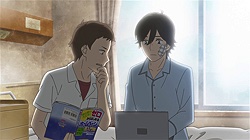 |
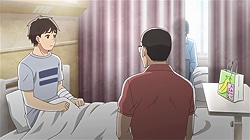 |
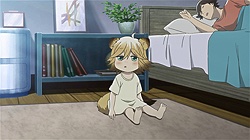 |
 |
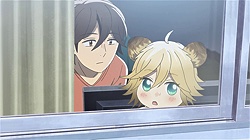 |
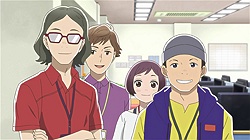 |
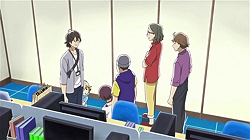 |
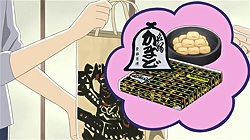 |
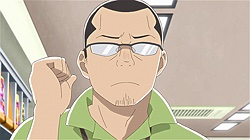 |
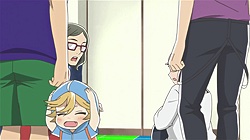 |
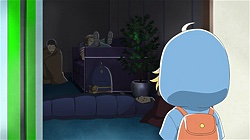 |
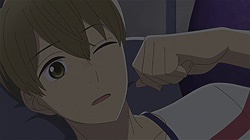 |
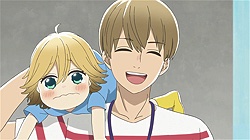 |
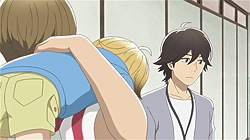 |
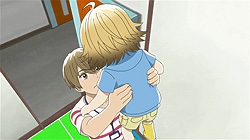 |
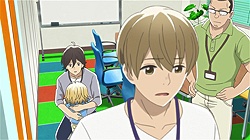 |
 |
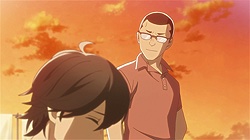 |
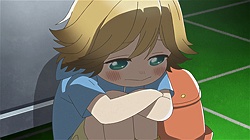 |
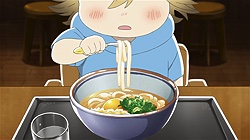 |
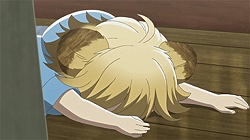 |
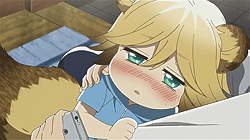 |
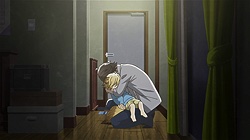 |
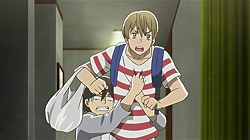 |
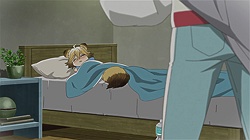 |
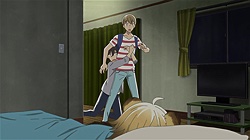 |
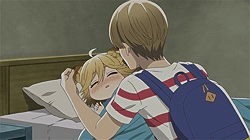 |
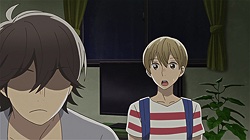 |
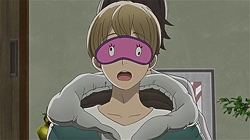 |
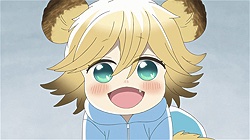 |
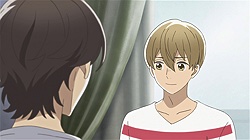 |
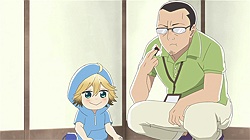 |
 |
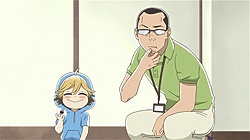 |
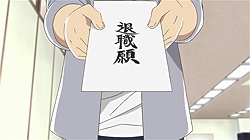 |
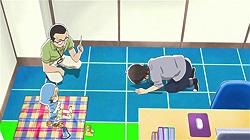 |
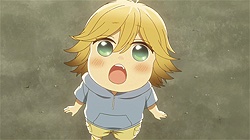 |
 |
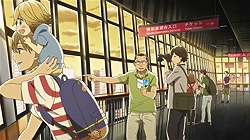 |
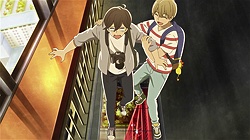 |
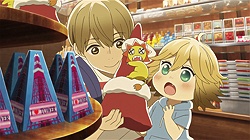 |
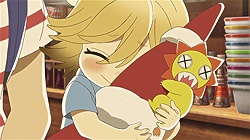 |
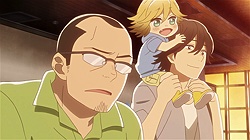 |
 |
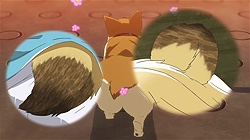 |
「東京タワー」 (Toukyou Tawaa)
“Tokyo Tower”
There’s a sweet melancholy to Udon no Kuni no Kiniro Kemari that cuts through me even at the best of times. Given that I find myself in rather a vulnerable emotional state at the moment, what with each new outrage that comes whistling down the news wires, this series hits me even harder. As Woody Allen once wrote, the world would be a wonderful place if it weren’t for certain people. But we get the world we get, whether we like it or not.
I find a similar syndrome developing with Udon no Kuni that I’ve seen with a few other similar series. That is, anime fans have (through no fault of their own) become so used to emotional falsity that emotional truth no longer rings true to them. This is something like what Stephen Colbert means with the term “truthiness”, I think – what feels true seems truer than what is true. I don’t want to drag politics into this post (the point pretty much makes itself) but I do think that’s one reason why Udon no Kuni hasn’t been more widely embraced than it has. Heck, I even saw one person complain “there’s not enough udon” – they, at least, should be pleased with this episode.
There’s an old saying that “every time a door closes, another one opens up”, but I think Udon no Kuni is quite aware of the flipside of that. There are choices to be made in life, and when we gain something we normally have to give something up in exchange. When Souta left Takamatsu to go to Tokyo, he certainly gained much. He was able to start a career, and able to express himself creatively for the first time in his life. But he lost the connection to his family (especially his father) and the place where he grew up. He gained a new life, but he gave up home.
There are clearly connections between a lot of people and events in this story, coincidental or not. When Souta was recovering from his surgery, he was working on Nakajima’s fishing website – and their conversations were overheard by the other inhabitants of the room. I’m not sure the patient was connected (he was voiced by Fukuyama Jun, but his name is different than Jun’s priest character – whose family name is the same as KanaHana’s character), but his visitor certainly was. That was Hamada Gorou (played by Kuroda Takaya, who also plays Gaogao-chan), who takes an interest in the young Souta’s web project because it’s what he does for a living.
Of such chance events are lives often changed, and so it is here. If you thought Souta leaving Tokyo and coming home was going to be a slam-dunk, Udon no Kuni isn’t that sort of story. It seems clear to me that Souta genuinely loves what he does, and that the gruff Hamada-san became a father figure to replace the one Souta had shut out of his life. When Souta takes Poko to Tokyo with him to help out at the desperate plea of his kouhai Nagatsuma Hiroshi (Tachibana Shinnosuke), both Hamada and Hiroshi are perplexed that Souta has attached himself to someone else’s kid and is asking to extend his leave – but to an extent, so is Souta.
Do people really treat little kids the way Hiroshi initially treats Poko (though he does come around)? Poor Poko gets a lot of initial gruffness from scary adults, doesn’t he? And he doesn’t take well to Tokyo at first – I actually thought for a while he was sick from being too far removed from the source of his spiritual power. In taking care of the ill Poko Souta pretty proves that this is who he is now – Poko is his priority. But he’s giving up something very significant in cutting his ties with Hamada and his company (working remotely is extremely rare in Japan, where the corporate culture is so entrenched in society) – these people have become a sort of family to him, and the love of creating is a very important part of who Souta is.
I’m still dubious about the idea of Souta taking over his father’s udon restaurant, because it really seems to me that his dream was the one he followed – and indeed, Hamada-san sets him up with a chance to possibly pursue it in Kagawa. Souta’s desire to reconnect with his roots is clearly intense and genuine, but does it stretch so far as to take over his father’s dream at the expense of his own? I’m convincible, but I’m not there yet based on what we’ve seen so far. Udon no Kuni has a habit of taking the narrative road less traveled, and I suspect it’s going to continue to do so.
Preview
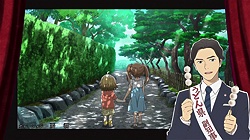 |
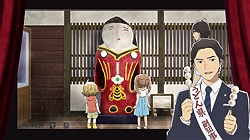 |
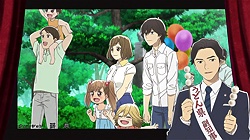 |
Omake
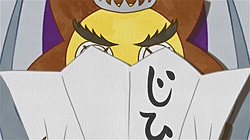 |
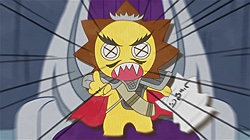 |
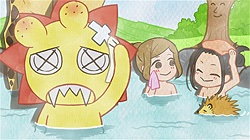 |

This is one of those series which I give up trying to guess what’s going to happen and just enjoy the ride.
I see apparently he is a good cook (good with his hands that is), but like you said, I’m not v keen on him taking over his father’s business :s
I wonder if there’s an osmosis factor there – growing up with a father who cooked for a living, wouldn’t most kids pick up some of it?
I love this series so much, and really speaks to me — Like Souta, I left home as soon as I could to pursue a career in new york but at the cost of my friends at home. I haven’t been to my home country in the last 4 years, and since the election, the call of going back is certainly very strong.
Most of my childhood friends – best friends; have grown up or married or have children, they lead lives very different from mine, and while social media has helped a lot, I do miss the kind of conversations I used to have with them, the closeness and the ease of just tapping or messaging someone for food or coffee quickly. I love my life here and the knowledge that I “made” it the way very few immigrants have — but at the same time, sometimes it can be lonely and miss home